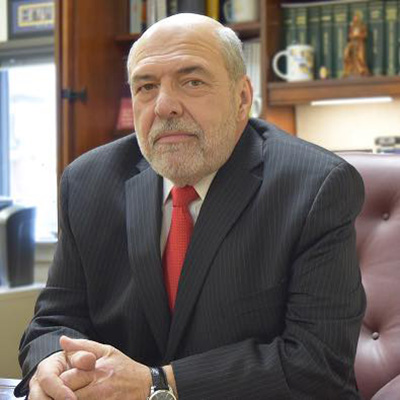
Mark Rossi
Four decades after starting as an adjunct professor at Briar Cliff, Mark Rossi, Chair of the Business Department, is confident in the quality of business education available for students.
Rossi worked as an attorney in his youngest career days, including at a Sioux City firm. Rossi took his turn as an adjunct professor beginning in 1984, where he primarily taught young undergraduate students in the morning, before returning to finish his full day as an attorney.
After some time with that, he also began teaching courses for non-traditional students in the evenings and weekends. Sometime later after having heart surgery, Rossi recognized it might be time for a career change by assuming a full professorship at Briar Cliff, since “I enjoyed this more than I did practicing law.”
He went full-time as a professor in 2005, then in 2013, assumed the chair duties of the Department of Business Administration. Now, Rossi also serves as director of both the Master of Arts in Management and the Business Degree Completion program. For the current 2023-24 academic year, he is also Chair of the Faculty Senate.
Rossi heads a team of undergraduate and graduate school professors that totals 13. They deliver instruction to one of the biggest segments of students at Briar Cliff, teaching roughly 25 percent of all BCU undergrads on campus, plus another 70 students taking Master’s courses.
“It is challenging. It keeps me busy, there is never a dull moment,” he said. “My goal for the students is that they leave Briar Cliff with the knowledge and skills to jump right into the workforce, to be someone who can immediately contribute to their employer and community in an ethical manner.”
Rossi is a native of Rochelle, Illinois, who attended college at Illinois State University, exiting with a degree in political science and legal studies. He worked for a year in Washington, D.C., for Congressman John Anderson of Illinois, with his most memorable work coming on the 1978 Foreign Intelligence Surveillance Act bill that was passed into law. After Anderson ran for president as an independent for the 1980 campaign cycle, Rossi decided it was time to undertake law school. After earning his law degree from Creighton University in Omaha in 1982 and practicing law in that city for a short time, he followed a tip by a friend to come work for a firm in Sioux City.
It was during his work for the Rawlings Nieland Probasco Killinger Ellwanger Jacobs & Mohrhauser firm that Rossi began teaching at BCU for the Business Law I and II courses, back when the Business Department was headed by George Frangedakis. As the current chair, he says he runs the department in a way that’s not autocratic.
“As a manager, my leadership style is democratic, in that when we have department meetings, everyone is able to speak, to say what is on their mind,” Rossi said.
In selecting business professors, Rossi typically leans heavily towards those with experience in various business facets. Some Briar Cliff professors have worked for Fortune 500 companies.
“It is extremely important that they have real-world experience,” he said.
Freshmen business students usually delve into such introductory courses as Microeconomics, Macroeconomics, Principles of Management and Accounting, and then with some feel for the business world they are versed to pick which of the available majors best suits them. The largest major in the department is Business Management, while many Briar Cliff students become double majors.
Rossi said students after graduation have gone onto top jobs, such as with the so-called Big Four accounting firms. He said word of mouth among business employers is strong, as many readily know BCU students are well-versed in a host of roles in the business, accounting, finance, and human resource fields.
He has set up a Business Advisory Board of local Siouxland business officials, which is an entity designed to give input on what those companies need in employees. Rossi said that kind of BAB input has resulted in Briar Cliff adding such recent courses as Business Analytics and Business Communications. In the latter class, students get more drilling to better prepare them for oral and written communications.
“We try to formulate our curriculum based on what the community business needs are, and that has proven very beneficial to us,” Rossi said.
This is part of a series of Faculty Stories profiling all the chairs of BCU academic departments in 2023.